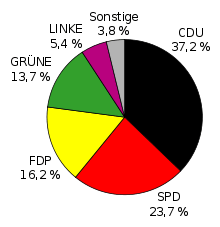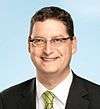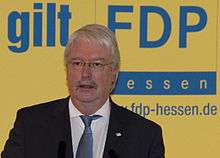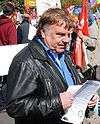Hessian state election, 2009
| | |||||||||||||||||||||||||||||||||||||||||||||||||||||||||||||||||||||||||||||||||||||
| |||||||||||||||||||||||||||||||||||||||||||||||||||||||||||||||||||||||||||||||||||||
| |||||||||||||||||||||||||||||||||||||||||||||||||||||||||||||||||||||||||||||||||||||
| |||||||||||||||||||||||||||||||||||||||||||||||||||||||||||||||||||||||||||||||||||||
Early state elections for the Landtag of Hesse were held in Hesse on 18 January 2009. The reason for the early elections was the inability of the parties to form a government after the inconclusive 2008 Hessian election.
Issues and background
Hesse had been in the midst of political deadlock since January 2008, as a new government was still not formed by the Fall of 2008. The reason that ideologically-allied parties could not form a government was the existence of a bloc of far-left Linke party delegates in the Landtag. The CDU/FDP did not have a majority, nor did the SPD/Greens. Both the Linke party and the Greens pushed hard for a "red-green-red" (SPD-Greens-Linke) coalition, but the SPD initially refused this. The only other option was a grand coalition along the model in the Bundestag after the 2005 election, but this was also very unpopular.[1]
SPD leader Andrea Ypsilanti finally gave in and attempted to negotiate with the Linke party to form a red-green-red coalition, reneging on a promise she had made earlier in the year to never negotiate with the far-left.[2] This action caused an internal revolt among Hesse's SPD Landtag members, resulting in Ypsilanti being cast out as leader and new elections being called.[3]
This election became in effect a referendum on the SPD; although the CDU remained unpopular, the SPD was now much less popular after recent events.
Roland Koch, the CDU party leader in Hesse and minister-president of Hesse before the 2008 elections, also acted as interim minister-president until 31 August 2010. And so even though the CDU had suffered a stinging electoral defeat in 2008, Roland Koch had not been unseated due to the inability of the SPD to form a new government.
The candidates for the office of minister-president in 2009 were the incumbent Roland Koch of the CDU; the new Hesse SPD party leader, Thorsten Schäfer-Gümbel; Tarek Al-Wazir for the Greens; Jörg-Uwe Hahn for the FDP; and Willi van Ooyen for the Linke.
Outcome

Popular anger at the SPD over the political crisis and deadlock, and anger among some of its centrist supporters that the SPD leadership would negotiate with the far-left, led to a collapse in the SPD's support;[4] it received its lowest vote share in Hessian history. The SPD won less than 25% of the total seats in 2009, down from 38% in 2008. The former-SPD voters split evenly between the FDP and the Greens. The Greens received their highest vote share ever as a result of this.
The 2008-2009 Hesse Landtag saga is seen as a black eye and an embarrassment for the political left in Germany. Despite the CDU's weakest support in decades, the left bungled its opportunity to unseat the CDU, which now remained in power. A CDU-FDP government was formed after the election.
| Party | Ideology | Vote % (change) | Seats (change) | Seat % | |||
|---|---|---|---|---|---|---|---|
| Christian Democratic Union (CDU) | Christian Democracy | 37.2% | +0.4% | 46 | +4 | 39.0% | |
| Social Democratic Party (SPD) | Social Democracy | 23.7% | −13.0% | 29 | −13 | 24.6% | |
| Free Democratic Party (FDP) | Classical liberalism | 16.2% | +6.8% | 20 | +9 | 17.0% | |
| Alliance '90/The Greens (GRÜNE) | Green politics | 13.7% | +6.2% | 17 | +8 | 14.4% | |
| The Left (Die Linke) | Democratic socialism | 5.4% | +0.3% | 6 | 0 | 5.1% | |
| Free Voters (FW) | Various, lean right | 1.6% | +0.7% | ||||
| National Democratic Party (NPD) | Ethnic nationalism | 0.9% | 0 | ||||
| The Republicans (REP) | National conservatism | 0.6% | −0.4% | ||||
| Pirate Party (PIRATEN) | Pirate politics | 0.5% | +0.2% | ||||
| Civil Rights Movement Solidarity (BüSo) | LaRouche movement | 0.2% | +0.2% | ||||
| All Others | -- | 0% | −1.4% | ||||
| Total | 100.0% | 118 | +8 | 100.0% | |||
Turnout was at 61.0%, down from 64.3% in 2008. 61.0% marks the lowest turnout for a Landtag election in Hesse's history. Only the non-binding 1946 election (while Hesse was still under military occupation) had a lower turnout.
References
- ↑ "Ypsilanti Is Strictly Against A Grand Coalition": http://www.webnews.de/kommentare/119321/0/Ypsilanti-strikt-gegen-grosse-Koalition-in-Hessen.html
- ↑ http://www.derwesten.de/nachrichten/nachrichten/politik/2008/10/8/news-81876495/detail.html
- ↑ "Umfrage in Hessen zeigt erdrutschartige Verluste für SPD". Reuters. 2008-12-04. Retrieved 2008-12-05.
- ↑ "SPD Continues to Sink in Popularity": http://www.hr-online.de/website/rubriken/nachrichten/indexhessen34938.jsp?rubrik=34954&key=standard_document_35901984




